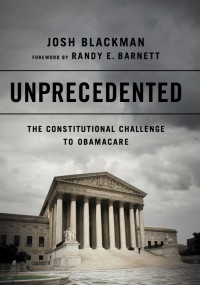Harry Reid recently said that Obamacare brings us a “step” towards single-payer health care. Avik Roy links to an interview Reid gave on Nevada Week in Review, as reported in the Las Vegas Sun.
Reid said he thinks the country has to “work our way past” insurance-based health care during a Friday night appearance on Vegas PBS’ program “Nevada Week in Review.”
“What we’ve done with Obamacare is have a step in the right direction, but we’re far from having something that’s going to work forever,” Reid said.
When then asked by panelist Steve Sebelius whether he meant ultimately the country would have to have a health care system that abandoned insurance as the means of accessing it, Reid said: “Yes, yes. Absolutely, yes.”
As I discuss in Unprecedented, In 2010, no one was really happy with Obamacare. Conservatives wanted thought it went too far. Liberals thought it didn’t go far enough. At the time, many prominent progressives pined for a public option–which was defeated during the early debates–and sought to impose single-payer.
No one was really happy with the public option. To Democrats, it did not go far enough—many of the more progressive members of the caucus sought single-payer health care. But in February 2009, Democratic Senator Max Baucus, chairman of the Senate Finance Committee, said, “There may come a time when we can push for single-payer. At this time, it’s not going to get to first base in Con- gress.” House Speaker Nancy Pelosi agreed: “For thirty years I have supported a single-payer plan, but our next best choice is to support an exchange and a public option.”
Reid’s comments reflect this difficulty with the public option.
The idea of introducing a single-payer national health care system to the United States, or even just a public option, sent lawmakers into a tizzy back in 2009, when Reid was negotiating the health care bill.
“We had a real good run at the public option … don’t think we didn’t have a tremendous number of people who wanted a single-payer system,” Reid said on the PBS program, recalling how then-Sen. Joe Lieberman’s opposition to the idea of a public option made them abandon the notion and start from scratch.
Eventually, Reid decided the public option was unworkable.
“We had to get a majority of votes,” Reid said. “In fact, we had to get a little extra in the Senate, we have to get 60.”
Barrack Obama has had a dynamic view on health care, evolving rapidly over the years.
However, this had not always been Obama’s approach to health care. His views “evolved” quite frequently. In June 2003, then-state senator Obama said he was “a proponent of a single-payer health care program . . . a universal health care plan. And that’s what I’d like to see.” Yet, as he rose to national prominence and campaigned for the presidency, he adopted a more moderate position, though he was often unclear about the details. In his 2006 memoir The Audacity of Hope, Obama sketches out his vision of “what a serious health-care reform plan might look like.” Among his ideas was to “allow anyone to purchase . . . model healthcare plan[s] . . . through existing insur- ance pools.” These were the exchanges that would ultimately appear in the ACA. Yet at this point he said nothing in favor of a mandate.
At one debate, Hillary Clinton summed up nicely Obama’s mean- dering position on health insurance: “When Senator Obama ran for the Senate, he was for single-payer and said he was for single-payer if we could get a Democratic president and Democratic Congress.” Now, she pointed out, his position had changed. In response, Obama conceded that, at heart, he would have preferred a single-payer sys- tem: “What I said was that if I were starting from scratch, if we didn’t have a system in which employers had typically provided health care, I would probably go with a single-payer system.” Clinton chided, “As time went on, the last four or so years, he said he was for single-payer in principle, then he was for universal health care. And then his pol- icy is not, it is not universal.”
Obama tried to explain his evolution, noting that though his “plan hasn’t changed . . . the politics have changed a little bit.” Comparing Obama’s evolving position to his tendency to “vote ‘present’” as a state legislator, Clinton stressed that she was “not running for president to put Band-Aids on our problems,” but wanted “to get to universal health care for every single American.”
